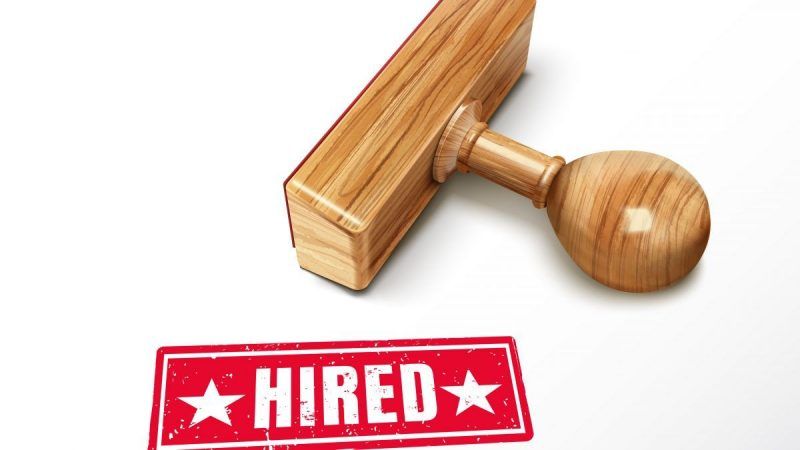E-Verify: Making Life Harder for Workers and Small Businesses, With Enthusiastic MAGA Support
E-Verify makes life harder on immigrants who want to work, but it doesn't make things better for anyone—-even those who want to see those immigrants leave.

Florida's Trumpy congressman Matt Gaetz has an article in the Tallahassee Democrat encouraging his state to impose "E-Verify" on all workers, as some states already do. In other words, he wants to curb the alleged crisis of illegal immigration by ensuring that no one can work in his state without meeting government-imposed documentation mandates and getting approval from a government database.
Gaetz is a Republican, so feel free to insert the obligatory reference here to the GOP's alleged former devotion to not hobbling Americans with officious red tape.
Not that he admits that there is any red tape involved. Gaetz gripes that "Florida Senate President Bill Galvano…has argued E-Verify will be costly and time-consuming for businesses," but the congressman insists that this "couldn't be further from the truth. Not only is E-Verify free, it processes applications quickly and efficiently. It is a simple step employers can (and should) take to ensure they are hiring legal employees."
A new study from the National Bureau of Economic Research (NBER) says otherwise. The congressman may believe that because the government doesn't literally charge a fee to run employees through their system, it's costless. But the paper's authors—economists Shalise Ayromloo, Benjamin Feigenberg, and Darren Lubotsky, all of the University of Illinois at Chicago—note that "there are non-trivial set-up, training, and compliance costs to using the system. These costs are particularly cumbersome for small firms, which a 2011 analysis suggested would spend $2.6 billion on compliance-related costs if forced to utilize E-Verify."
The law, which is currently imposed on some or all workers in 22 states, is thus widely flouted, and smaller firms are more likely to evade it.
The NBER paper is based on "a new analysis of administrative data from the Department of Homeland Security on usage of the E-Verify system." It finds "a high degree of non-compliance," especially "among firms with fewer than 20 employees," and infers from this that "the mandates may impose substantial costs."
Do not conclude from this that the system has no effect at all: The economists found reasons to believe that E-Verify produces "significant declines in Hispanic worker employment." But they saw "no evidence that native-born workers benefit from E-Verify mandates," and in fact found that those mandates "reduce employment among some lower-skilled groups of native-born workers." Specifically, "the passage of any E-Verify mandate reduces employment among natives with a high school degree or less education by 2.7 percent," an effect "entirely driven by reduced employment among low-skilled natives who are 16 to 40 years old."
So the costs of E-Verify don't seem to pay off by helping the lower-skilled Americans often invoked as an excuse for imposing the aggravating mandate.
Indeed, despite those employment declines among Hispanics, the authors did not find evidence that E-Verify lowers the actual "potentially undocumented population" in areas where the system is enforced. The authors suggest that they're instead getting by with "increases in supplementary family income sources"—i.e., being helped by others in their households.
All employers are supposed to use I-9 forms to check potential employees' citizenship status, but without E-Verify federal law doesn't force employees to verify the authenticity of whatever document a would-be worker supplies. The Cato Institute's Alex Nowrestah has found that the existing I-9 system already "costs employers an estimated 13.48 million man-hours each year." E-Verify magnifies those costs considerably. And when something goes wrong with the system, nearly half of the problem cases can take up to eight days to resolve, creating uncertainty and paralysis for both hired and hirer—and giving employers an incentive just to cut out potential workers who might have eventually made it through the system.
How often does E-Verify mistakenly mark people as legally unable to work when they should have been approved? About 0.15 percent of the time, which sounds impressive, but if it were applied to every American worker via federal mandate it would leave more than 187,000 people a year barred from work for no reason at all.
The system can be gamed with borrowed or stolen identify documents, and the low compliance with state mandates does not hold out promise of success for any federal mandate that might come along. But do not expect E-Verify's failures to produce a humble retreat if it were to be imposed nationally. Nowrastah speculates that the feds would instead try to "close the E-Verify loopholes" by integrating "other biometric information like fingerprints or perhaps even DNA into a national identity system." As we know from past government expansions of allegedly single-problem programs, such an identity system may well expand to other uses, from gun registries to tracking the members of minority groups—whatever your personal surveillance dystopia looks like, expanding E-Verify makes it more likely. The program embodies the "papers please" mentality that in more innocent days signaled a sinister tyranny to any decent American.


Show Comments (86)